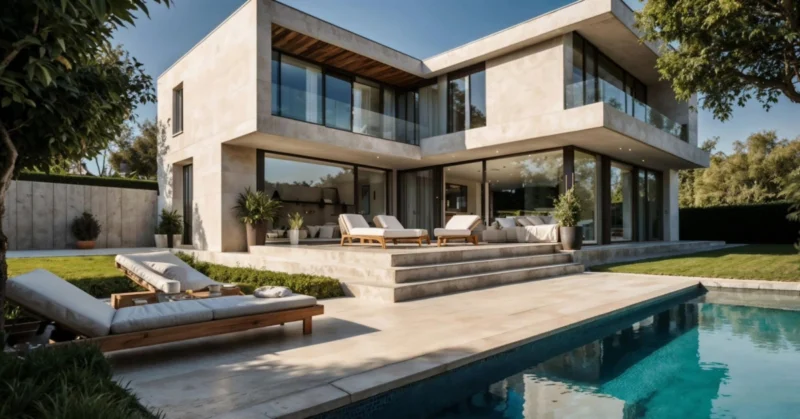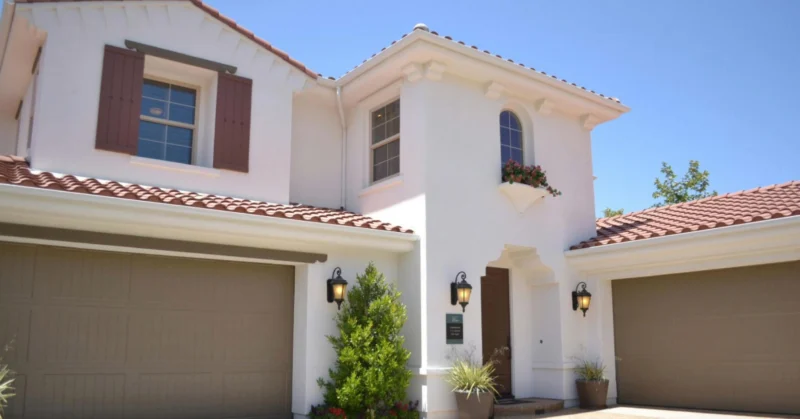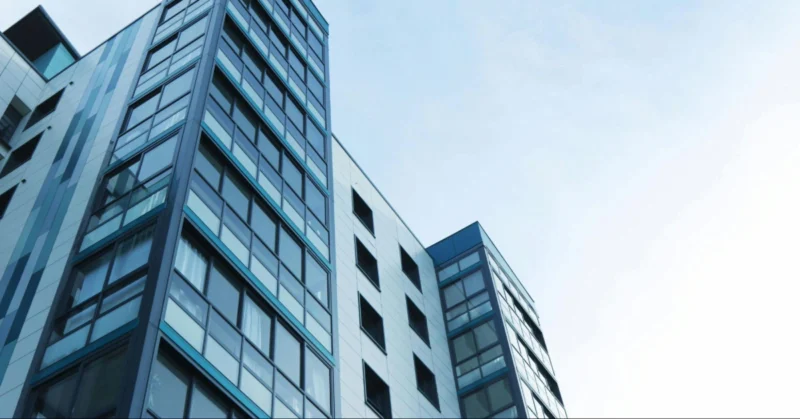Planning a renovation in Dubai? From compact corners to capacious courtyards, whether you’re sprucing up a small space or revamping a roomy residence, calculating the costs clearly is key. Renovation is no longer just about style; it’s a strategic step that strengthens your lifestyle and supports long-term value.
Apartments allow for a more controlled cost curve, even with curated finishes, while villas come with vast volumes, varied layouts, and value-adding features like pools or private gardens, all of which push prices higher. This guide provides a clear and cost-conscious comparison to help you plan purposefully.
- Average villa vs. apartment renovation cost in Dubai
- A cost comparison of renovating a villa vs. an apartment
- Key factors influencing the renovation cost
- Tips to control renovation costs in Dubai
- Key takeaways
- FAQs
Average villa vs. apartment renovation cost in Dubai
Cost of renovating a villa
The average cost of getting a renovation in Dubai spans from 300,000 AED to 5,000,000 AED. This sweeping scale covers everything from partial polishing to full property overhauls. Within this pricing, you can implement substantial structural shifts and premium personalisation throughout your home.

Cost of renovating an apartment
Depending on the material mix and finish finesse, apartment renovation costs can range between 500 AED and 2,500 AED per m². For a standard-sized space, the total spend often falls between 50,000 AED and 200,000 AED.
If you’re mindful of your money and prefer modest upgrades, pick space-savvy improvements. Moreover, durable, design-friendly materials can stretch your savings further. Smartly streamlining the layout also boosts value while trimming your overall bill.
A cost comparison of renovating a villa vs. an apartment
| Metric | Apartment | Villa |
| Renovation cost per sq. ft. | 50 AED to 200 AED per sq. ft. | 150 AED to 600 AED per sq. ft. |
| Elaborate renovation cost | 70,000 AED to 400,000 AED (depending on scope) | 500,000 AED to 1,200,000 AED (extensive upgrades) |
| Permit fees | 75 AED to 100 AED per m² (Dubai Municipality approvals) | From 50 AED per m² (villa-specific renovation approvals) |
| Service charges | 10 AED to 30 AED per sq. ft. annually | 2 AED to 6 AED per sq. ft. annually |
| Common upgrades | Smart lighting, space-saving layouts, and budget-friendly materials | Custom cabinetry, pools, curated courtyards, and connected tech |
| Hidden/extra costs | Temporary transfers, tidy-ups, and trash treatment | Pool preservation, patio polishing, and potential plumbing repairs |

Key factors influencing the renovation cost
1. Size and layout
Villas cover vast volumes with varied layouts and valuable luxuries, raising renovation requirements and resulting in higher costs.
Apartments, on the other hand, offer compact canvases perfect for practical, purposeful upgrades. Swapping standard surfaces for sleek stone or replacing regular lighting with smart solutions can refresh the space without draining your dirhams.
2. Material and finishes
Villas demand premium products, personalised pieces, and powerful smart tech, pushing renovation prices up significantly.
Apartments, in contrast, benefit from budget-friendly basics like engineered wood and LED lighting. These sensible selections streamline spending without sacrificing style.
3. Permits and regulatory costs
Renovating a villa or apartment requires regulatory reviews. Dubai Municipality permits are essential to ensure safety, structure, and legal compliance.
Permit prices depend on the property’s size and scope and range from 500 AED to 15,000 AED. If you’re planning electrical enhancements, you may also need DEWA approval, which typically costs between 500 AED and 1,000 AED.
4. Service charges and annual fees
Annual amounts vary widely depending on the dwelling. Apartment owners pay for shared spaces, with service fees ranging from 10 AED to 30 AED per square foot per year, and soaring to 70 AED in sought-after spots like Downtown Dubai.
Villas, while benefiting from lower per-foot fees (2 AED to 6 AED), often face higher final figures due to their sprawling spaces and sizable plots.

Tips to control renovation costs in Dubai
Controlling the cost of renovation in Dubai demands thorough planning, especially if you are comparing the cost of villa vs. apartment accommodation. The features and size of a villa can increase the overall cost of the entire project. However, apartments allow budgets to be kept under control.
No matter which type of property you are renovating, certain tips and tricks can help you bring down the overall cost of renovation in Dubai.
1. Keep realistic budgets
Setting sensible spending limits helps you forecast finances and build a buffer for bumps along the way. This cushion covers costly surprises, like delayed deliveries, sudden structural fixes, or unexpected permit fees, keeping your project steady from start to finish.
2. Don’t rely on one quote
Choose certified contractors cleared by the Dubai Municipality. Then, collect at least three competitive quotes to compare costs and capabilities. Prioritise proven professionals over the cheapest choice to ensure quality, compliance, and a smoother renovation journey.
3. Choose a phased renovation
If your budgets don’t allow for an expansive renovation project, go phase-wise. Give priority to essential areas of the house, and then move on to the remaining parts as and when your budget allows.
4. Prioritise areas with higher ROI
Prioritise power-packed spaces, like lighting, lavatories, and layouts in the kitchen, as they offer prime returns in both rental and resale value. Studies suggest a solid 75% to 80% ROI when these spaces are styled smartly with premium materials.
Beyond basics, boosting your home with smart systems, like sensor lighting and seamless climate control, can raise property value by 10% to 15%. These tech-forward touches particularly please digitally driven buyers in Dubai’s dynamic market.
5. Ensure thorough research and comparison
While you may choose the best websites and magazines to shortlist the design of your new, renovated home, the cost of materials and trends in Dubai might differ from your findings. Ensure that you do thorough research on the Dubai market, which will allow you to set realistic budgets.
6. On-board an expert
A design-driven expert, like a Dubai-based designer or architect, can cut costs while keeping style. Their local know-how helps swap pricey picks for practical, pocket-friendly alternatives, all while staying safely within the city’s standards and regulations.
7. Work with experienced project managers
Experienced professionals who understand how the permit system works in Dubai can prove to be an asset to your project. They can help you avoid any compliance errors and prevent the extra costs.
Key takeaways
Renovation budgets in Dubai differ widely between apartments and villas. Apartment upgrades typically cost 50,000–200,000 AED, while villa projects range from 300,000 to 5,000,000 AED, depending on scope and scale. Permits and service fees also impact expenses. High-rise apartments often carry monthly maintenance costs of 3–30 AED per square foot, while villas average 2–6 AED annually, though their larger size may increase total spend. With Property Finder, homeowners gain access to expert SuperAgents and specialists who help optimise costs, ensure compliance, and select smart materials. They also provide real-time market rates, ROI insights, and community fee guidance.
Frequently Asked Questions (FAQs)
Depending on the selection of material and complexity of the renovation, the cost to renovate an apartment in Dubai varies between 70,000 AED and 400,000 AED.
The price to renovate a villa in Dubai ranges between 500,000 AED and 1,200,000, depending on the property size and scope of work.
Yes. For simple surface-level sprucing, permits may not be necessary. But for plumbing, power systems, or structural shifts, approval from Dubai Municipality is essential. These permits typically range between 5,000 AED and 20,000 AED.
Before beginning a renovation, plan for potential pauses, like paying for temporary accommodation, dealing with debris disposal, and managing surprise structural setbacks.